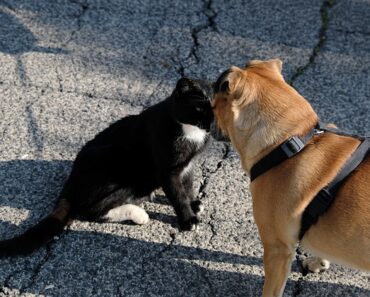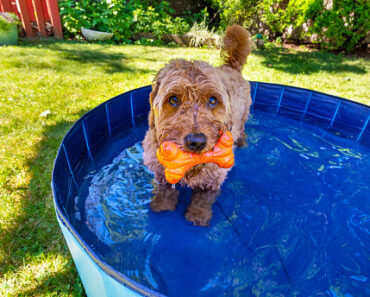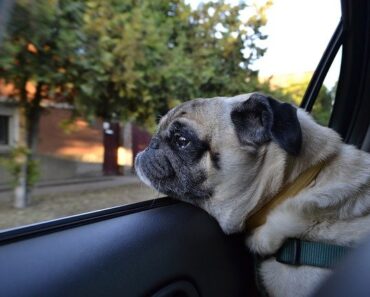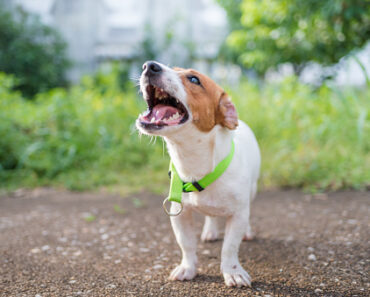
Why does my dog bark or cry while I’m away?
The barking or yelping of a dog alone can have different causes, including discomfort, anxiety, sociopathy, etc…
Discomfort. Before considering various behavioural problems, first check that your dog has everything he needs: does he need to urinate? Is he hungry or thirsty? Is he cold? Is he suffering?
Separation anxiety, which manifests itself in several forms: barking, destruction, self-mutilation… as soon as you leave the house. Generally, the dog is very close to you when you are present, does not move away from you during walks, etc… This anxiety must be differentiated from other stress, lack of exercise, illness or other behavioral problems. Separation anxiety in dogs results from excessive attachment to the owner. This syndrome usually begins at a very young age, when the puppy is separated from its mother and siblings. Frightened in his new environment, he develops an over-attachment to his new landmark, especially since the new family usually pays a thousand attentions to their new four-legged companion.
Anxiety related to hypersensitive-hyperactive syndrome (HS/HA), a behavioural disease of the young dog. The dog is overexcited, very sensitive to the slightest stimulus. Generally, this type of dog has permanent problems, not just while you are away.
A sociopathy can also resemble “loneliness” in the dog. The animal has difficulty taking its place in the family, the hierarchy is destabilized and the dog “thinks he’s the boss”. Barking is more like aggressive, sometimes territorial growling.
How to prevent it?
Prevent discomfort. Check that all the above needs are met. This is essential for your dog! Don’t forget to take him out before you leave, fill his bowl with water, feed him if necessary. He must have a comfortable basket and toys of his own. You can also provide him with a heating mat, if necessary.
Prevent separation anxiety. It is very important to prevent separation anxiety as soon as you acquire your dog. For this, a phase of “rejection” is necessary early in the dog’s life. The first few nights are often delicate for the puppy. It is generally recommended to have the puppy sleep in your room (in his basket, not in your bed!) the first few nights after his arrival in the family. This should be temporary! The distance is established gradually, by moving the basket from room to room. It is also very important to leave the puppy alone when you are present in the apartment: go about your business, push him away if he is too sticky, ignore his barking or yelping, etc… It is very important not to abuse the contact and caresses with the puppy during the first days or even the first weeks: don’t worry, you will make up for it afterwards, for the time being, do not respond to his requests. When you have to go away, it is useless to warn your dog when you leave and to double the amount of caresses. This would only reinforce the emptiness at the time of your absence. On the contrary, one hour before you leave, ignore your dog, send him back in his basket if he comes to ask for attention. Similarly, when you return, do not show your joy, ignore your dog for a few minutes.
Prevent the HS/HA syndrome. This is difficult if not impossible, since the HS/HA syndrome is the result of a defect in the acquisition of self-control, this acquisition being done by the mother, before weaning.
Prevent sociopathies. It is essential to educate your dog well and to impose a hierarchy on him. To do this, establish simple rules, notably by defining the territory: no climbing on the sofa, sleeping basket, play area, eating area, etc. All mischief must be dryly but calmly reprimanded. These cues are acquired at a young age, so it is very important to be strict as soon as the puppy arrives in your family.
How to heal?
Healing separation anxiety. This is a matter of patience and thoroughness. The basic rules of education, the same as for preventing separation anxiety, must be followed, but the process will take longer. Always remain calm, never brutal. It is useless to take the dog by the skin of the neck and shake him. Don’t scold him afterwards, he will have already forgotten the nonsense done during the night. When you are away, you can provide him with soothing smells, for example an old piece of clothing that used to belong to you, this will act like a “cuddly toy” with the children. You can also use a diffuser of a soothing pheromone for the dog – normally secreted by the mother a few days after giving birth, which will calm and reassure him (Adaptil diffuser). It is also possible to place your dog in a transport crate. Indeed, some dogs feel lost in a large space and prefer to feel confined. Be careful, however, this should not be a punishment! The dog should gradually get used to the transport crate, which should always be left open. It is also advisable to give him some exercise before your absence: a long walk will tire him and he will be more likely to fall asleep. Agility or swimming is also a good way to tire him out. Playing music while you’re away can also calm your dog down.
Cure HS/HA syndrome. The treatment of HS/HA syndrome is long, mainly behavioral. To instill self-control in the dog, therapy often involves play, usually with a ball. Drug therapy is usually combined with medication. The treatment of HS/HA syndrome must imperatively be carried out with the help of a behaviourist veterinarian, who accompanies both the dog and the handler!
Curing sociopathies. Here again, the basic rules of education must be instilled, calmly and rigorously. It’s a long process but it works if you stick to the strict rules set.
To remember:
- In all cases, it is imperative to consult a specialized behaviorist veterinarian, who will be able to guide you.
- Do not punish your dog with violence. Even though this type of problem can be wearisome, remember that it is not his fault, nor yours, and that a solution is always possible.
- On the other hand, removal of the vocal cords should never be considered! It is a cruel practice, which does not solve the cause of barking.
- Wearing bark collars should also be considered with caution, on the advice of a behaviorist. In all cases, it must be combined with good education and behavioral/medical therapy.






